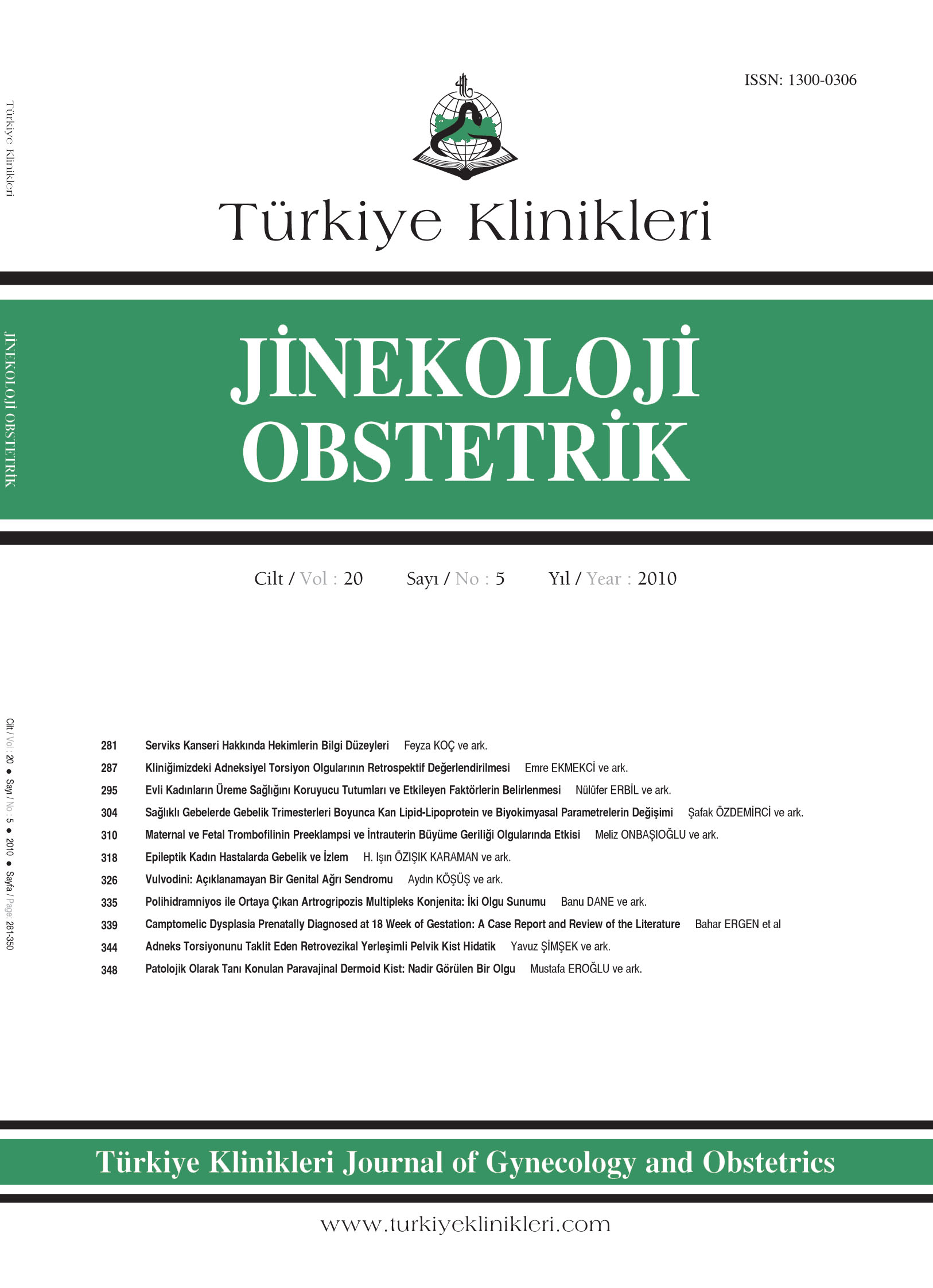Open Access
Peer Reviewed
CASE REPORTS
3279 Viewed1150 Downloaded
Retrovesical Hydatid Cyst of Pelvis Mimicking Adnexal Torsion: Case Report
Adneks Torsiyonunu Taklit Eden Retrovezikal Yerleşimli Pelvik Kist Hidatik
Turkiye Klinikleri J Gynecol Obst. 2010;20(5):344-7
Article Language: TR
Copyright Ⓒ 2025 by Türkiye Klinikleri. This is an open access article under the CC BY-NC-ND license (http://creativecommons.org/licenses/by-nc-nd/4.0/)
ÖZET
Hidatik kist, Echinococcus granulosus tarafından oluşturulan endemik bir parazitik hastalıktır. Etkenin esas konağı köpeklerdir, insan ve koyunlar ara konaktır. Klinik prezentasyon hastalığın yerleşim yeri ve kistlerin boyutu ile ilişkili olarak değişkendir. En sık tutulum yeri karaciğer sağ lobudur ancak pankreas, pelvis, kemik gibi atipik tutulum yerleri görülebilir. Primer pelvik hidatik kist oldukça nadir görülür. Bu yazıda 24 yaşında, alt batında şiddetli karın ağrısı ile başvuran bir hasta sunuldu. Hastanın batın ultrasonografisinde sağ over komşuluğunda soliter bir kitle saptandı. Diğer batın bulguları normaldi. Adneks torsiyonu ön tanısı ile hasta opere edildi ve over ile ilişkisiz bir kitle çıkartıldı. Patolojik inceleme sonucunda pelvik kist hidatik tanısı koyuldu. Postoperatif takibi sorunsuz olan hasta gastroenteroloji poliklinik takibine yönlendirildi.
Hidatik kist, Echinococcus granulosus tarafından oluşturulan endemik bir parazitik hastalıktır. Etkenin esas konağı köpeklerdir, insan ve koyunlar ara konaktır. Klinik prezentasyon hastalığın yerleşim yeri ve kistlerin boyutu ile ilişkili olarak değişkendir. En sık tutulum yeri karaciğer sağ lobudur ancak pankreas, pelvis, kemik gibi atipik tutulum yerleri görülebilir. Primer pelvik hidatik kist oldukça nadir görülür. Bu yazıda 24 yaşında, alt batında şiddetli karın ağrısı ile başvuran bir hasta sunuldu. Hastanın batın ultrasonografisinde sağ over komşuluğunda soliter bir kitle saptandı. Diğer batın bulguları normaldi. Adneks torsiyonu ön tanısı ile hasta opere edildi ve over ile ilişkisiz bir kitle çıkartıldı. Patolojik inceleme sonucunda pelvik kist hidatik tanısı koyuldu. Postoperatif takibi sorunsuz olan hasta gastroenteroloji poliklinik takibine yönlendirildi.
ABSTRACT
Hydatid disease is a parasitic infection caused by Echinococcus granulosus, which is endemic in certain areas. Dogs are main host for the parasite, whereas human and sheeps are intermediate hosts. The clinical presentation of the hydatid disease is various which depends on the size and the site of the cystic lesions. The most common localization of cysts is right hepatic segment but atypical localizations of cysts (pancreatic, peritoneal, pancreatic) are also reported. Primary pelvic hydatid cyst is rare condition. Here, we report a 24 years-old patient who had severe abominal pain at lower quadrants. Abdominal ultrasound findings were normal except a solitary mass which was adjacent to the right ovary. Patient was undergone a laparotomy with a presumptive diagnosis of adnexal torsion. A solitary mass that was not related with the right ovary was excised. A hydatid cyst disease of pelvis was diagnosed after histologic investigation. Postoperative follow-up was uneventful and the patient was referred to the gastroenterology clinic for further follow-up.
Hydatid disease is a parasitic infection caused by Echinococcus granulosus, which is endemic in certain areas. Dogs are main host for the parasite, whereas human and sheeps are intermediate hosts. The clinical presentation of the hydatid disease is various which depends on the size and the site of the cystic lesions. The most common localization of cysts is right hepatic segment but atypical localizations of cysts (pancreatic, peritoneal, pancreatic) are also reported. Primary pelvic hydatid cyst is rare condition. Here, we report a 24 years-old patient who had severe abominal pain at lower quadrants. Abdominal ultrasound findings were normal except a solitary mass which was adjacent to the right ovary. Patient was undergone a laparotomy with a presumptive diagnosis of adnexal torsion. A solitary mass that was not related with the right ovary was excised. A hydatid cyst disease of pelvis was diagnosed after histologic investigation. Postoperative follow-up was uneventful and the patient was referred to the gastroenterology clinic for further follow-up.
MENU
POPULAR ARTICLES
MOST DOWNLOADED ARTICLES





This journal is licensed under a Creative Commons Attribution-NonCommercial-NoDerivatives 4.0 International License.










